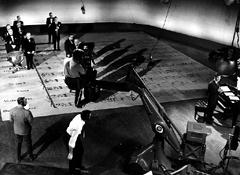Omnibus (US TV series)
| Omnibus | |
|---|---|

Leonard Bernstein's debut appearance, 1954
|
|
| Genre | Variety |
| Developed by | Robert Saudek and the Ford Foundation |
| Directed by | Bob Banner, Mel Ferrer, Jeffrey Hayden Don Hewitt, Andrew McCullough, Delbert Mann, Bob Miller, Cyril Ritchard, John Stix, |
| Presented by | Alistair Cooke |
| Country of origin | United States |
| Original language(s) | English |
| No. of seasons | 8 |
| No. of episodes | 164 |
| Production | |
| Running time | 90 min in first five seasons or 60-90 min in later seasons |
| Release | |
| Original network |
CBS (1952-1956) ABC (1956-1957) NBC (1957-1961) |
| Picture format |
Black-and-white Color |
| Audio format | Monaural |
| Original release | November 9, 1952 – April 16, 1961 |
Omnibus is an American, commercially sponsored, educational television series.
Omnibus was created by the Ford Foundation, which sought to increase the education level of the American public. The show was conceived by James Webb Young who hired Robert Saudek as producer. Saudek believed that Omnibus could "raise the level of American taste" with educational entertainment.
The show was broadcast live, primarily on Sunday afternoons at 4:00pm EST, from November 9, 1952 until 1961. Omnibus originally aired on CBS, and later on Sunday evenings on ABC. The show was never commercially viable on its own, and sources of funding dwindled after the Ford Foundation ended its sponsorship in 1957. That year, the program moved to NBC, where it was irregularly scheduled until 1961.The show's first season had an audience of 4 million, which grew to 5.7 million at its peak in 1957. ABC aired a brief revival of the series in 1981.
The series won more than 65 awards, including eight Emmy Awards (it was nominated for thirteen) and two Peabody Awards. The series is held at The Library of Congress and Global ImageWorks, among other archives. The Bernstein Omnibus programs were released in a 4-DVD set for Region 1 and Region 2 in 2010.
The show, hosted by Alistair Cooke in his American television debut, featured diverse programming about science, the arts, and the humanities. The program featured original works by playwrights such as William Saroyan, interviews with public figures such as architect Frank Lloyd Wright, and performances by many of the most prominent entertainers of the day such as Jack Benny and Orson Welles. A heavily abridged version of Shakespeare's King Lear starring Orson Welles and directed by Peter Brook, was telecast on 18 October 1953 on CBS. Leonard Bernstein and Jonathan Winters made their first television appearances in the series. Bernstein gave his first televised music lectures on the program, and conducted one of the earliest telecasts of excerpts from Handel's Messiah on it. The best remembered episode featuring Bernstein was his first, transmitted on November 14, 1954: an analysis of Beethoven's Fifth Symphony in which the conductor demonstrated what the music might have been like if Beethoven had left some of his discarded music sketches in the symphony.
...
Wikipedia
